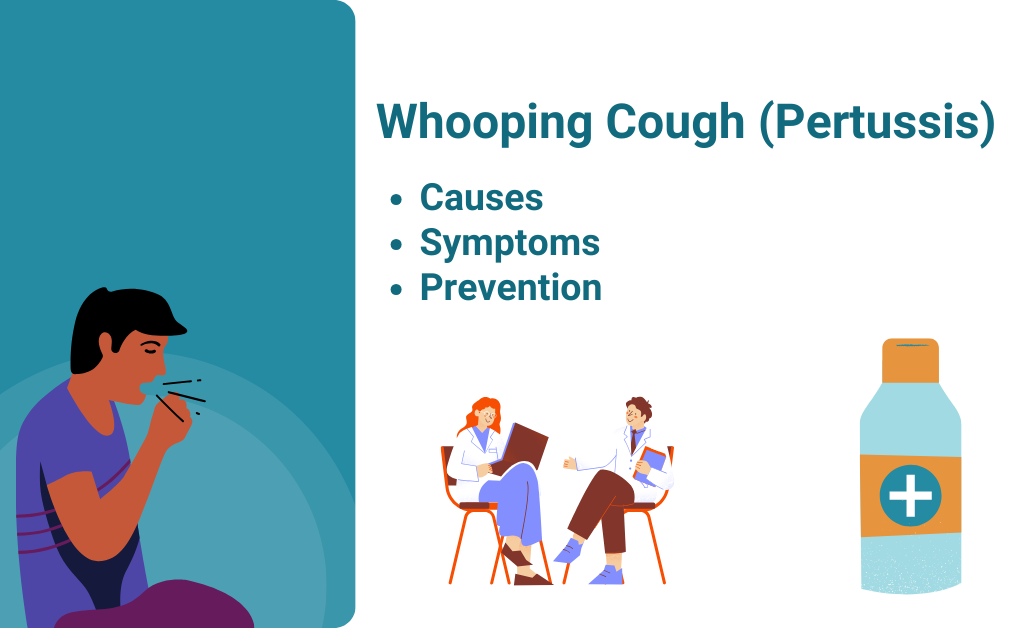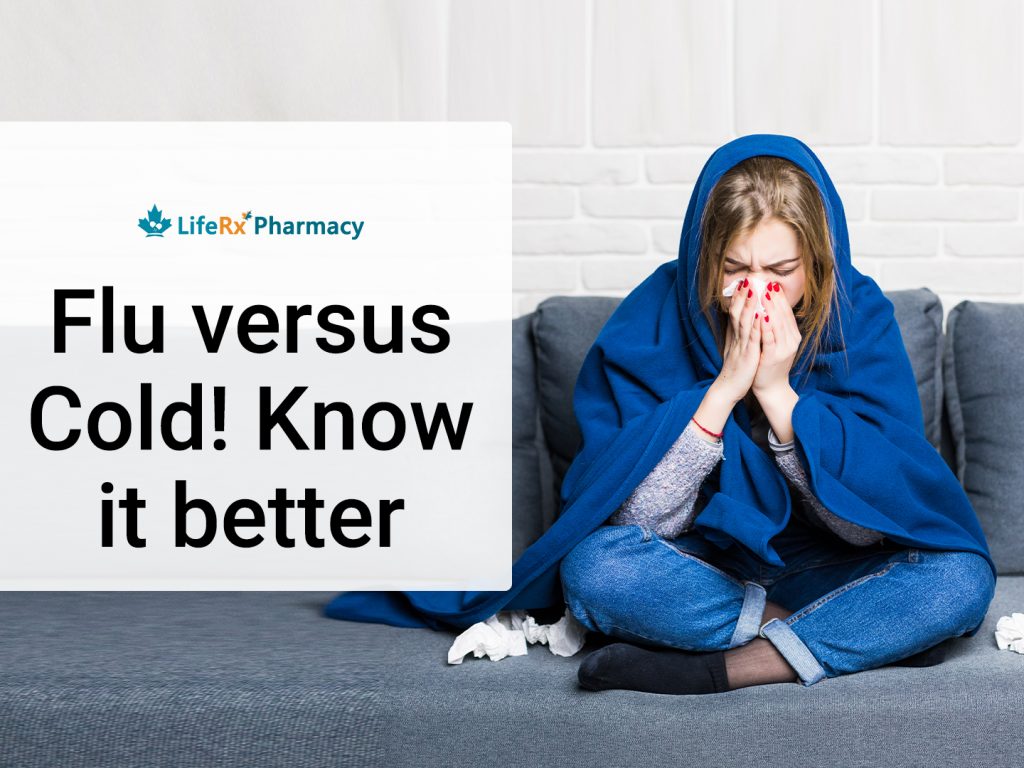A widespread respiratory infection among infants and young children across the world can be life-threatening if left untreated. The illness is highly contagious and can even affect immunocompromised people of other age groups. Thankfully, there is a whooping cough vaccine available to prevent illness and an effective antibiotic course to fight off the infection.
To avoid contracting a cough infection or its spread, one must be aware of the causes, symptoms, and preventive measures. Besides, one must also be aware of its spread, complications, treatment, and prevention.
What Is Whooping Cough (Pertussis)?
Medically termed as pertussis, it is a bacterial infection of the respiratory tract of only humans. It develops when bacteria named Bordetella pertussis attach to the cilia in the lining of the breathing passages- the nose and throat. On sticking to the cilia, it damages the cilia with its released toxins. This leads to swelling and inflammation of the airway and ultimately long-lasting, dry cough and other symptoms.
The illness got its name based on its characteristic sign- the long stretches of strong cough ending with a high-pitched whooping sound. The whooping noise is the result of deep, fast breaths taken in between the stretches of coughs that persist for weeks or months.
How Does Pertussis Spread?
When a pertussis-infected person coughs, sneezes, or laughs, small droplets containing bacteria may travel through the air. A healthy person who shares breathing space with an infected person can breathe in those droplets and catch the infection.
Common Symptoms of Whooping Cough
Pertussis symptoms can vary among infected individuals based on their age and whether they have been immunized or not. An affected person usually exhibits symptoms within 5-10 days, but some may take up to 3 weeks or more to develop symptoms following exposure.
In the initial stages, the infection often mimics a typical cold. Symptoms may include a runny nose, low-grade fever, and a light or infrequent cough, which can persist for one to two weeks.
The signs of a severe infection may include:
- Coughing fits- rapid coughs followed by a whooping noise, especially at night
- Vomiting during or after coughing fits
- Exhaustion or fatigue following stretches of coughing
- Apnea and skin turning blue (in babies).
These signs may last for up to 10 weeks or more and require prompt medical attention.
Take note, in vaccinated people, infection is usually not likely, and if it occurs, the symptoms are mild and temporary. The cough episodes are fewer.
Who Is at Risk of Getting Pertussis?
Pertussis can make anyone sick. However, it’s most likely for the following individuals to be diagnosed with infection and be at higher risk of complications from the illness:
- Infants (under 6 months)
- Elderly people
- Unvaccinated or partially vaccinated people
- Individuals with chronic illness or a weak immune system
- Parents, caregivers, and anyone who is in close contact with babies having pertussis.
How Is Whooping Cough Diagnosed?
Here’s what a general physician does to diagnose an infection:
- Reviews complete medical records of the patient and family, including noting the symptoms.
- A thorough physical exam
- Routine blood test- to check for WBC count, which helps diagnose an infection
- Chest X-ray- to check for fluid build-up in the lungs- the sign of pneumonia
- A laboratory test of a throat swab- to test for bacteria causing pertussis.
Treatment Options for Pertussis
As pertussis is a bacterial infection, antibiotics are the only treatment for pertussis. An early treatment can help make the infection less serious and even prevent its spread. If sick with pertussis for 3 weeks or more and received no antibiotics, the antibiotic treatment at this stage won’t work, and the patient has to be hospitalised for medical care.
To feel better and recover soon, some of these at-home practices can work:
- Plenty of rest to regain body strength to fight the infection
- Intake of small, frequent meals to avoid vomits after coughing fits
- Clean the surrounding air to avoid irritants and soothe coughing
- Staying hydrated to heal faster.
Medications for Pertussis (Whooping Cough)
Medications for pertussis (whooping cough), including Klacid and Zithromax. Antibiotics are the primary treatment for pertussis, especially when started early.
- Klaricid (Clarithromycin): A macrolide antibiotic effective in eliminating Bordetella pertussis bacteria, commonly prescribed for both children and adults.
- Zithromax (Azithromycin): Another macrolide antibiotic, often preferred due to its shorter course and better tolerance, especially for infants and young children.
These antibiotics are typically prescribed during the early stages of the illness for maximum benefit.
Complications of Untreated Pertussis
A severe infection can make it difficult for the person to breathe normally and get enough oxygen to meet their body’s needs. Low oxygen level in the bloodstream resulting from untreated pertussis in children can lead to serious complications such as:
- Pneumonia
- Apnea
- Seizures
- Convulsions
- Brain damage/ bleeding in the brain
- A severe cough in teens and adults can even cause:
- Broken blood vessels
- Bruised ribs
- Abdominal hernias
- Difficulty sleeping
- Urinary leakage.
How to Prevent Whooping Cough?
- Immunization: The best way to avoid having a cough is to be vaccinated. CDC encourages getting the pertussis vaccine, as recommended. Young children aged under 6 years should get the DTaP (Diphtheria, Pertussis, and Tetanus) vaccine in 5 doses. The first three doses at 2, 4, and 6 months; the fourth dose at 15-18 months; and the last dose at 4-6 years.
Preteens, individuals aged 11-12 years, should get a Tdap booster dose, and women should even get the booster dose during their pregnancy, between 27 and 36 weeks, to keep the newborn safe. For all those who haven’t received the vaccine at these recommended schedules, they should get Tdap. - Post-exposure antimicrobial prophylaxis (PEP)- It includes an antibiotic course for someone who has been exposed to pertussis-causing bacteria, to prevent someone from getting sick with a cough.
- Good hygiene- Following standard hygiene practices is crucial to prevent the spread of respiratory illnesses like pertussis.
To prevent whooping cough and its severe complications, early diagnosis, proper treatment, and timely vaccination are essential. Always consult a healthcare provider if symptoms arise, especially in children and vulnerable adults. For prescribed antibiotics and cough relief medications, you can rely on trusted services like online pharmacy website Life Rx Pharmacy for safe and convenient delivery.
FAQs
Is whooping cough contagious?
Yes, it is highly contagious. Spreading occurs through the release of respiratory droplets when an infected individual coughs or sneezes, especially in the early stages before severe symptoms begin to develop.
Can adults get whooping cough?
Yes, adults can contract infection, especially if they have not received a recent booster. These usually milder symptoms can still pose a risk to others, including infants and those with weakened immune systems.
What does a whooping cough sound like?
Infection causes severe bouts of coughing, with a ‘whooping’ sound made on the intake of breath. Children generally exhibit this unique sound more frequently, whereas adults mostly have a protracted, dry cough without the classic ‘whoop’.
Can you recover from whooping cough without antibiotics?
In some cases, yes. They do, however, prevent the symptoms from worsening and spreading. It is even more important for infants and susceptible groups to be given antibiotics to avoid complications.
Is there a vaccine for whooping cough?
Yes, the DTaP and Tdap vaccines can protect against infection. Immunization should be administered according to the recommended dose schedule for infants, children, and adults to maintain immunity and protect public health.
How long does whooping cough last?
The duration of whooping cough is typically 6 to 10 weeks, although it can sometimes last even longer. It generally lasts through three stages: mild symptoms of a cold, extreme attacks of coughing, and the gradual healing process of several weeks.
Can newborns get vaccinated for pertussis?
Pertussis vaccination cannot be given to newborns until 6 weeks of age. Maternal vaccination during pregnancy and vaccination of close contacts protect an infant, known as the cocooning approach.
What is the difference between a normal cough and whooping cough?
A normal cough is mild and does not last long; the whooping cough begins with severe bouts of coughing, often accompanied by a whoop afterward, or the child may even vomit. It lasts for weeks.


